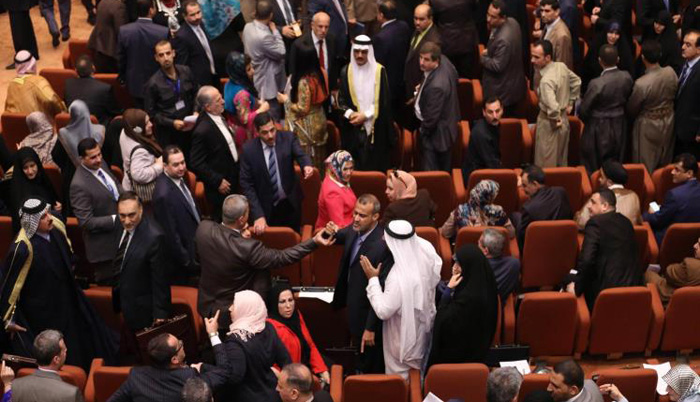Martin Chulov
A corrupt political class has led a 13-year pillage on public money in the pursuit of power. As oil prices fall, further jeopardising the country’s revenues, there is little hope that governance will improve
O ne of Iraq’s anti-corruption leaders sat in his office, waving his hands in exasperation. “There is no solution,” he said. “Everybody is corrupt, from the top of society to the bottom. Everyone. Including me.”
Coming at the start of a conversation about Iraq’s ailing governance, and what was being done to turn things around, Mishan al-Jabouri’s admission was jarring. “At least I am honest about it,” he shrugged. “I was offered $5m by someone to stop investigating him. I took it, and continued prosecuting him anyway.”
Jabouri is a member of one of two anti-graft bodies, a parliamentary committee, tasked with protecting public monies in post-war Iraq. Both have more work than they can ever hope to deal with – even if they wanted to.
Now, with plunging oil prices leaving Iraq’s revenues in more jeopardy than at any time since the US invasion, attention is shifting to what the custodians of public funds have done over more than a decade with tens of billions of dollars that could otherwise be a buffer from such a budget shock.
If, as projected, global oil prices remain at historic lows, Iraq will be unable to pay some of its civil servants, or honour pledges to build roads and power stations in the next financial year. The gravity of the crisis has created uncomfortable reckonings for Iraq’s political class, military leaders and some senior religious figures, who have led a staggering 13-year pillage that has left Iraq consistently rated as one of the top five least transparent and most corrupt countries in the world.
“Believe me, most of the senior names in the country have been responsible for stealing nearly all its wealth,” said Jabouri. “There are names at the top of the tree who would kill me if I went after them. When people here steal, they steal openly. They brag about it. There is a virus here, like Ebola. It is called corruption. There is no hope, I am sorry to say.”
Across all levels of society, a realisation is sinking in that Iraq is now entering a phase that could prove every bit as destabilising – perhaps even more so – than the war against Islamic State. Jamal al-Bateekh, a senior tribal leader with the ear of the political class, said: “For 12 years we have gone through the process of opening the budget in the parliament. But we have never closed it. There has never been a reckoning. All that time, they have been dividing the carcass into pieces.”
“This is existential,” said former deputy president Ayad Allawi, whose office was abolished late last year in a cost-saving drive. “There are organised corruption syndicates running the country, let alone militias. I tell you very frankly, no Iraqi power can take action on this.”
Over the past four months, some of Iraq’s top office holders, led by prime minister Haider al-Abadi, have tried to do just that. Emboldened by Iraq’s highest religious authority, Ayatollah Ali al-Sistani, Abadi has tried to launch an anti-corruption drive designed to weed out the most guilty and introduce meaningful accountability processes across all levels of business and politics.
Sistani, who has remained taciturn throughout most of his career, had been unusually strident during his Friday sermons, delivered through a spokesman until he stopped them in protest in January. “We spoke so much until our voices were hoarse, yet nobody listened,” he said at the time.
“He was more strong, more fierce and in-depth than he’d ever been,” said Allawi of Sistani’s increasingly forthright interventions. “He knows how serious this is.”
Across Baghdad, the finance minister, Hoshyar Zebari, has been tasked with finding ways around a profound budget shortfall that Sistani, Abadi and others fear could soon lead to civic unrest and even retribution.







Comments